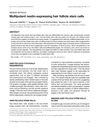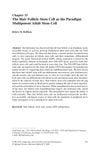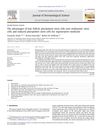Search
for
Sort by
Research
210-240 / 1000+ results
research Recurrent Episodes of Hair Loss in a 37-Year-Old Woman
The woman's hair loss was mainly due to stress and low iron levels, and her hair grew back after treatment.

research Telogen Effluvium: Long-Term COVID-19 Symptom
COVID-19 recovery can lead to temporary hair loss called telogen effluvium.
research The Human Hair Follicle: A Reservoir of CD40+ B7-Deficient Langerhans Cells That Repopulate Epidermis After UVB Exposure
Hair follicles help skin immune recovery after UVB exposure.

research Zinc as an Ambivalent but Potent Modulator of Murine Hair Growth In Vivo: Preliminary Observations
Zinc can both inhibit and stimulate mouse hair growth, and might help recover hair after chemotherapy.

research Effect of Adenovirus-Mediated Expression of Sonic Hedgehog Gene on Hair Regrowth in Mice With Chemotherapy-Induced Alopecia
Using a gene therapy with the Sonic Hedgehog gene helps mice regrow hair faster after losing it from chemotherapy.

research The Function of Zinc in Animal, Plant, and Human Nutrition
Zinc is important for growth and health in animals, plants, and humans, and not having enough can cause various problems.

research Outcome of Intra-Operative Injected Platelet-Rich Plasma Therapy During Follicular Unit Extraction Hair Transplant: A Prospective Randomized Study in Forty Patients
Injecting platelet-rich plasma during hair transplant surgery improves hair regrowth rate, speeds up skin recovery, and enhances hair quality.

research Clinical and Instrumental Characterization of Hair and Scalp Aging in Nonbalding Caucasian Women
Aging significantly affects the hair and scalp of nonbalding Caucasian women, with changes that differ from male pattern baldness.

research Hair Transplantation in Migraine Headache Patients
Some migraine sufferers had no more headaches after getting a hair transplant.
research Enhanced Expansion and Sustained Inductive Function of Skin-Derived Precursor Cells in Computer-Controlled Stirred Suspension Bioreactors
Using bioreactors, scientists can grow more skin stem cells that keep their ability to regenerate skin and hair.

research The Topography of Fibrous Scaffolds Modulates the Paracrine Function of Adipose-Derived Mesenchymal Stem Cells in the Regeneration of Skin Tissues
The shape of fibrous scaffolds can improve how stem cells help heal skin.

research Therapeutic Potential of Hair Follicle-Derived Stem Cell Intranasal Transplantation in a Rat Model of Ischemic Stroke
Transplanted hair follicle stem cells improved brain function and reduced damage after a stroke in rats.

research Recovery From Alopecia After COVID-19
A man's hair grew back to almost normal 7 months after COVID-19 without needing treatment.
research Radiation Dermatitis: Radiation-Induced Effects on the Structural and Immunological Barrier Function of the Epidermis
Radiation therapy damages skin structure and immune function, causing inflammation and potential hair loss.

research Convergent Genesis of an Adult Neural Crest-Like Dermal Stem Cell from Distinct Developmental Origins
Skin-derived precursors in hair follicles come from different origins but function similarly.

research Hair: Overview
The document explains how hair is studied in forensics to identify its source and its role in criminal investigations.

research Alopecia Areata Update
Half of people with Alopecia Areata may see hair regrowth within a year without treatment, but recovery is unpredictable.

research Hair Follicle Regeneration Using Grafted Rodent and Human Cells
Grafted rodent and human cells can regenerate hair follicles, but efficiency decreases with age.

research Multipotent Nestin-Expressing Hair Follicle Stem Cells
Hair follicle stem cells can turn into various cell types and help repair nerves.

research Chapter 4: Cytomechanics of Hair
Hair's strength and flexibility come from its protein structure and molecular interactions.

research Evaluating the Satisfaction of Patients Undergoing Hair Transplantation Surgery Using the FACE-Q Scales
Patients felt happier with their looks and younger after hair transplant surgery, but their well-being and social life didn't change much.

research Direct Implantation of Hair-Follicle-Associated Pluripotent Stem Cells Repairs Intracerebral Hemorrhage and Reduces Neuroinflammation in Mouse Model
Implanting hair-follicle stem cells in mice brains helped repair brain bleeding and reduced brain inflammation.

research Dermal Papilla Regulation of Hair Growth and Pigmentation
Dermal papilla cells are key for hair growth and color, influencing hair type and size, and their interaction with stem cells could help treat hair loss and color disorders.

research Telogen Effluvium: A Review
Telogen Effluvium is a common hair loss condition, particularly in women, with no specific FDA-approved treatment, and recovery can take up to 18 months.

research The Hair Follicle Stem Cell As The Paradigm Multipotent Adult Stem Cell
Hair follicle stem cells can turn into many cell types and may help repair nerve damage and have other medical uses.

research Making Magnesium Magnificent
Special astroglia cells improved stroke recovery in rats, a hair growth drug reduced cancer spread, and tiny magnesium structures were more easily shaped.

research Pathobiology of Chemotherapy-Induced Hair Loss
Chemotherapy causes hair loss by damaging hair follicles and stem cells, with more research needed for prevention and treatment.

research Stem Cell Plasticity Enables Hair Regeneration Following Lgr5+ Cell Loss
Hair can regrow after certain stem cells are lost because other stem cells can take over their role.

research The Advantages of Hair Follicle Pluripotent Stem Cells Over Embryonic Stem Cells and Induced Pluripotent Stem Cells for Regenerative Medicine
Hair follicle stem cells are a practical and ethical option for nerve repair in regenerative medicine.